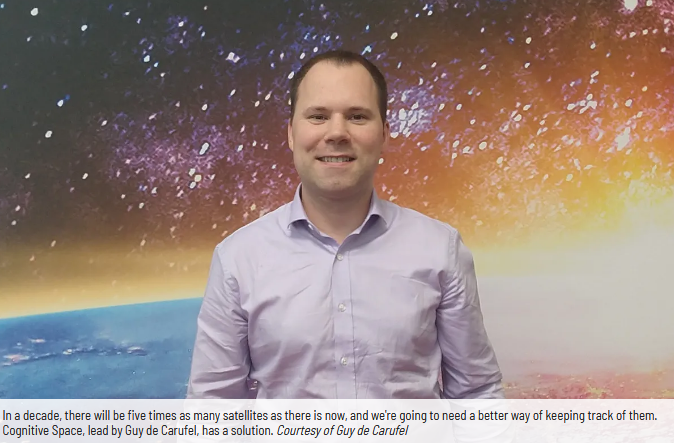Houston entrepreneur using cloud-based AI technology in space and satellite applications
There are around 2,000 satellites up above our heads, but in the next 10 years, that figure will have surpassed 10,000. As the number of satellites goes up, it’ll be harder for companies to manage them.
Houston-based Cognitive Space lead by Founder and CEO Guy de Carufel recognizes this as an opportunity to engage artificial intelligence and cloud technology. De Carufel spoke with InnovationMap about his company, how it will grow, and the role Houston plays in the evolving space exploration industry.

InnovationMap: How did you come up with the idea for your company and technology?
Guy de Carufel: From my experience working at [JSC], I understand the traditional way of commanding spacecraft and how you interface with that from the ground station point of view. In the industry, it’s changing very quickly in terms of new companies that are launching constellations of satellites. We’re currently at an inflection point where the satellite industry is expected to grow up to five folds in the next 10 years because of the large companies building up these satellites. There are around 2,000 satellites active right now, and that’s expected to grow to over 10,000 in the next 10 years.
With all these satellites, you’re going to need to manage these assets. Having an operator look at each satellite is not going to cut it. It’s not going to be enough for all these satellites. I’ve been investing and researching in AI technology and machine learning, and I came up with a different way of approaching the problem, and it’s a cloud-based approach to [managing the satellites.]
IM: What are some of the challenges of introducing a new technology in such a rapidly changing industry?
GC: Traditionally, the aerospace industry is very conservative and doesn’t adopt change very quickly. Especially from NASA’s point of view and large corporations’ point of view, it takes a lot of effort to implement changes — and there’s reasons behind that. Space crafts are very expensive to launch and mistakes are very costly. The industry doesn’t necessarily like to take too many risks, but that’s changing quickly. Now, there are a lot of startups in what’s called “new space.” You have a lot of companies being funded by venture capital. These startups are willing to take a lot more risks.



0 Comments